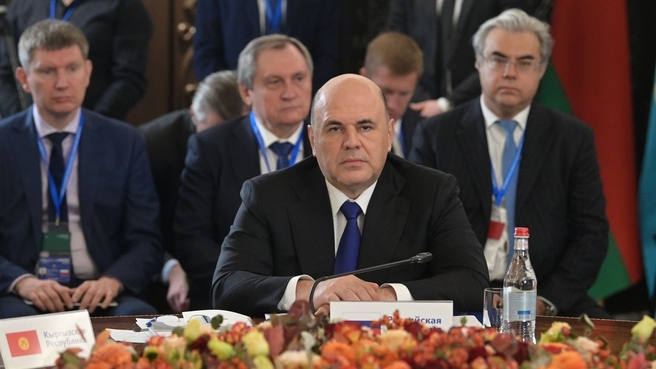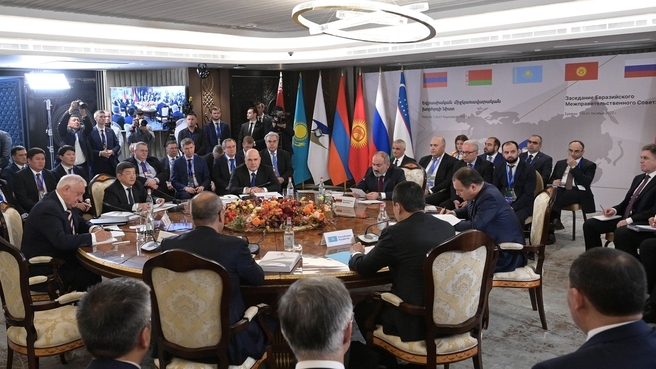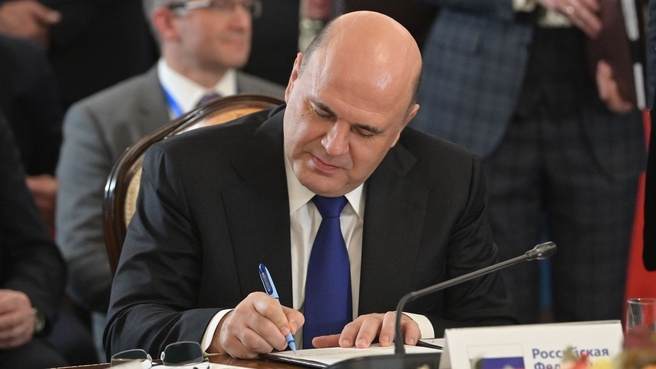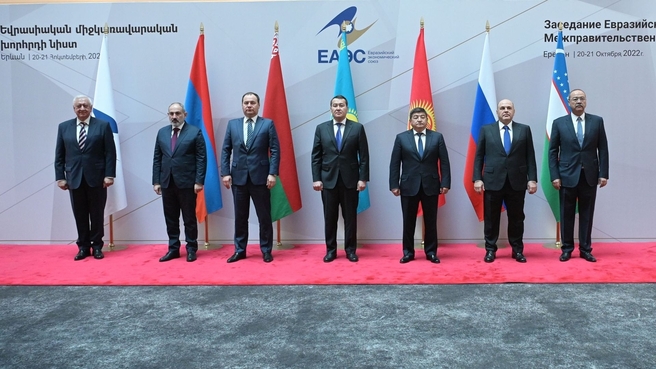The discussion focused on topical issues of Eurasian integration, as well as the operation of the Union's internal market, in particular, the prospects for the development and improvement of the Union’s integrated information system, and creation of a unified analytical system for the administration of e-commerce. The participants also reviewed the preparation of agreements on the formation of a common market for gas, oil and oil products.
Mikhail Mishustin’s remarks at the meeting
Delegation heads taking part in an expanded meeting of the Eurasian Intergovernmental Council:
Expanded meeting of Eurasian Intergovernmental Council
Prime Minister of the Republic of Armenia Nikol Pashinyan;
Prime Minister of the Republic of Belarus Roman Golovchenko;
Prime Minister of the Republic of Kazakhstan Alikhan Smailov;
Chairman of the Cabinet of Ministers, Chief of Staff of the Presidential Executive Office of the Kyrgyz Republic and Chair of the Eurasian Intergovernmental Council Akylbek Japarov;
Prime Minister of the Russian Federation Mikhail Mishustin;
Prime Minister of the Republic of Cuba Manuel Marrero Cruz (via video link-up);
Prime Minister of the Republic of Uzbekistan Abdulla Aripov;
Chairman of the Board of the Eurasian Economic Commission Mikhail Myasnikovich.
Mr Japarov, Mr Pashinyan, colleagues.
I am delighted to welcome the heads and members of the delegations as well as the representatives of observer states at the final meeting of the Eurasian Intergovernmental Council this year.
First of all, I would like to join the words of gratitude to the Armenian side and personally Mr Pashinyan for the outstanding organisation of our summit and traditional hospitality.
We continue to build a harmonious system of cooperation in all areas of the Union's activities, on a consensus basis, with respect for all EAEU member states’ points of view, in order to primarily improve the quality of life of our countries’ citizens and create the most comfortable business environment.
The dynamics of trade between EAEU states reflects the positive effect of the integration processes that we are discussing here, at this venue. Last year, mutual trade between the Union members reached its highest level in the entire history of our association: it exceeded $73 billion. This is almost 33 percent more than in 2020. And if we talk about food products or agricultural raw materials, then the growth was about 21 percent.
The physical volume of mutual deliveries increased by 11 percent.
The Russian rouble remained the main settlement currency and was used in 72 percent of payments.
Our integration is moving forward in difficult conditions (we talked about this in detail) during a turbulent period in the global economy and growing geostrategic tensions. External pressure on Russia and Belarus, of course, affects all members of the Union, above all the operation of the single market.
The unfriendly actions of several Western countries and their chosen path of sanctions, pressure, and political blackmail, are unacceptable for modern international relations. But we are aware that such a policy will not change overnight, and we must prepare solutions for a strategic perspective.
As President of Russia Vladimir Putin noted at a meeting of the Supreme Eurasian Economic Council, our joint activities are being built as planned, on a systematic basis. It is this approach and the effective implementation of urgent anti-crisis measures that made it possible for our economies to adopt to external shocks.
First of all, I am referring to the disruption of transport and logistics chains and the change in export-import flows.
This can be proven by statistics. Over the first six months of the year, the union's gross domestic product exceeded $1 trillion.
Investments in fixed capital increased by more than 6.5 percent, while the volume of completed construction by 3.5 percent.
Of course, we must consolidate all these trends in order to increase interaction in all areas, from the economy and trade to industrial production technologies, innovations, and the humanitarian sphere, which Mr Golovchenko has just spoken about in detail. Any cooperative projects should be welcomed, and they should be encouraged with all the tools that we have in our arsenal.
One of our key objectives is to deepen industrial cooperation. We certainly need to launch joint ventures in strategically important and high-tech industries, and to create a system of funding for such projects through subsidising their loan interest. This will advance technological development in all the EAEU member states.
We consider it extremely important to have at least three of the five EAEU states involved in each cooperation project. This approach will guarantee smaller economies’ access to new technologies, and will also stimulate integration processes in Eurasia as a whole.
Businesses in our countries know how to cooperate effectively: more cooperation chains are being formed based on new agreements; new enterprises are opening. And we need more such examples.
To make this happen, we need to stimulate the creation of joint ventures. Yesterday I attended the Made in Russia forum now underway in Moscow. It includes an exhibition of advanced technologies and products that domestic enterprises are exporting.
Each of the five EAEU states has plenty of innovations to offer, and excellent technological projects. We can share best practices, find common ground, and make significant progress capitalising on each other’s strengths.
Russia can also offer attractive solutions to Eurasian businesses focused on foreign markets.
We invite our EAEU partners to join the Russian Industrial Zone in Egypt. It gives significant advantages to companies that have at least 30 percent of their facilities concentrated in that zone. One of the benefits is the proximity to the main maritime transport infrastructure; residents also have privileges when using the ports on the Suez Canal. But most importantly, their exports to Africa, the Middle East, Latin America and other states that have trade agreements with Egypt will be exempt from customs duties. Such preferences apply to all potential residents, irrespective of their country of origin. I strongly advise you to consider this.
The main industries represented in the Russian Industrial Zone are mechanical engineering, the chemical, automotive, forestry industries and metallurgy.
While strengthening cooperation in international markets, we promote the fullest possible unlocking of the EAEU common market’s growth potential and the free movement of goods, services, capital and workforce.
We are already improving our approaches based on international experience. In all, (our colleagues talked about this in detail today), about 60 barriers have been eliminated. We welcome our common decision to complete the elimination of the remaining ones as soon as possible.
In the first half of this year, three new barriers were identified; five barriers and two obstacles were removed, and one exemption added.
Today, my colleagues and I have agreed on a coordinated joint effort to prevent the emergence of new barriers, primarily in trade.
One of the most important objectives for all EAEU member states remains the formation of common markets for gas, oil and petroleum products. We discussed this at length yesterday, as well as the electricity market. When we first agreed on this ten years ago, few could have predicted the rise in prices consumers around the world would face. But I believe that our union reliably protects its members from unjustified overpricing of energy, which proves that we have made the right choice of integration strategy and have been successfully implementing the previously concluded intergovernmental agreements.
We need to continue to coordinate efforts related to our transport policies. I am primarily referring to routes that pass through the EAEU territory. It is necessary to build transport and logistics chains in the eastward direction, as well as the International North-South Transport Corridor, given the redirection of commodity supplies and the close trade and economic cooperation with China and other Asia-Pacific states.
We consider it important to stimulate the relevant activities in the EAEU and jointly create the right conditions for increasing freight traffic and reducing the delivery time of goods.
Modern infrastructure is also necessary on our common continent for the development of the Greater Eurasian Partnership, an idea that Russian President Vladimir Putin recently proposed.
The digital agenda is also of particular relevance in modern conditions.
One of the indicators of progress in this field in the EAEU is the growing export of ICT products. Mutual trade in such products increased by more than 30 percent last year.
Advanced tech solutions contribute to faster growth in all sectors of the economy; they help to strengthen cooperation between countries, simplify and speed up all procedures.
We are preparing for the full-scale launch of an integrated information system within the EAEU. We discussed this in detail yesterday. The system will ensure digital interaction between the member states, which is critical today. We will create shared information resources for the five EAEU members.
Today we are approving a five-year targeted programme for this system’s development. It sets out the main guidelines for the modernisation of the legal framework for the creation of our common digital platform. It will become an effective and modern tool for developing business, trade and economic partnerships. I urge you to pay serious attention to this effort.
There is another important matter I would like to mention. Today we see a significant slowdown in the implementation of environmental projects in the West. This is happening due to the increased demand for energy.
The Eurasian Economic Union, on the contrary, has every opportunity to promote its climate agenda. We must use resources as rationally and as productively as possible.
Specific steps have already been outlined here. We have made progress in the elaboration of concept papers. We believe that we must continue to make every effort to bring our approaches in this field closer together.
Colleagues, friends,
The leaders of the five member states have spelled out our main goals in the Strategic Directions for the Development of Eurasian Economic Integration. The document also covers new areas of cooperation such as education, healthcare, tourism, and sports. These are the areas that have a direct impact on people’s quality of life. This is the most important indicator for us. Therefore, the implementation of the Strategic Directions should be a priority for each member state of our association.
At the same time, it is important to remain open to continuing dialogue with other states and strengthen international ties despite the pressure from the collective West.
The EAEU provides a reliable foundation for the development of the entire Eurasian region. And I am absolutely sure that together, we will achieve positive results in improving our citizens’ well-being.
The documents signed following a meeting of the Eurasian Intergovernmental Council:
– On the sources and mechanisms of financing industrial cooperation projects within the framework of the Eurasian Economic Union.
– On drafting technical specifications for an integrated analytical system of administering e-commerce in the Eurasian Economic Union.
– On implementing Disposition No. 7 of the Eurasian Intergovernmental Council, dated 5 February 2021.
– On eliminating obstacles on the internal market of the Eurasian Economic Union.
– On implementing Disposition No. 2 of the Eurasian Intergovernmental Council, On the Current State and Prospects for Deepening Integration within the Eurasian Economic Union, dated 25 February 2022.
– On drafting an international agreement on a common gas market of the Eurasian Economic Union.
– On drafting a treaty (protocol) on the common oil and petroleum products markets of the Eurasian Economic Union, including uniform rules of access to the services of oil and/or petroleum products transportation via the systems located in the Eurasian Economic Union member states.
– On amending Disposition No. 11 of the Eurasian Intergovernmental Council, dated 21 June 2022.
– On implementing Disposition No. 9 of the Eurasian Intergovernmental Council, dated 21 August 2021.
– On testing the use of electronic navigation seals during the transportation of goods by rail and/or road between the Kyrgyz Republic, the Republic of Kazakhstan and the Russian Federation.
– On the Russian Industrial Zone in the Suez Canal Economic Zone of the Arab Republic of Egypt.
– On the draft Eurasian Intergovernmental Council Disposition, On Approving the Targeted Programme for the Development of the Integrated Information System of the Eurasian Economic Union until 2027.
– On mutual trade among the Eurasian Economic Union member states in 2021.
– On the results of annual monitoring and analysis of the Strategic Guidelines for Expanding Eurasian Economic Integration.
– On the report on joint import substitution projects of the Eurasian Economic Union member states.
– Agreement on the rules of emission (issue), circulation and recovery of storage certificates for agricultural products within the framework of the Eurasian Economic Union.
– On the report on the establishment of common markets of oil and petroleum products in the Eurasian Economic Union in 2021.
– On the report on the establishment of the common gas market of the Eurasian Economic Union in 2021.
– On the transfer and distribution of import customs duties among the budgets of Eurasian Economic Union member states in 2021.
– On the First Package of Measures (Road Map) of the Eurasian Economic Union within the framework of the climate agenda.
– On the timeframe and site of the next meeting of the Eurasian Intergovernmental Council.















